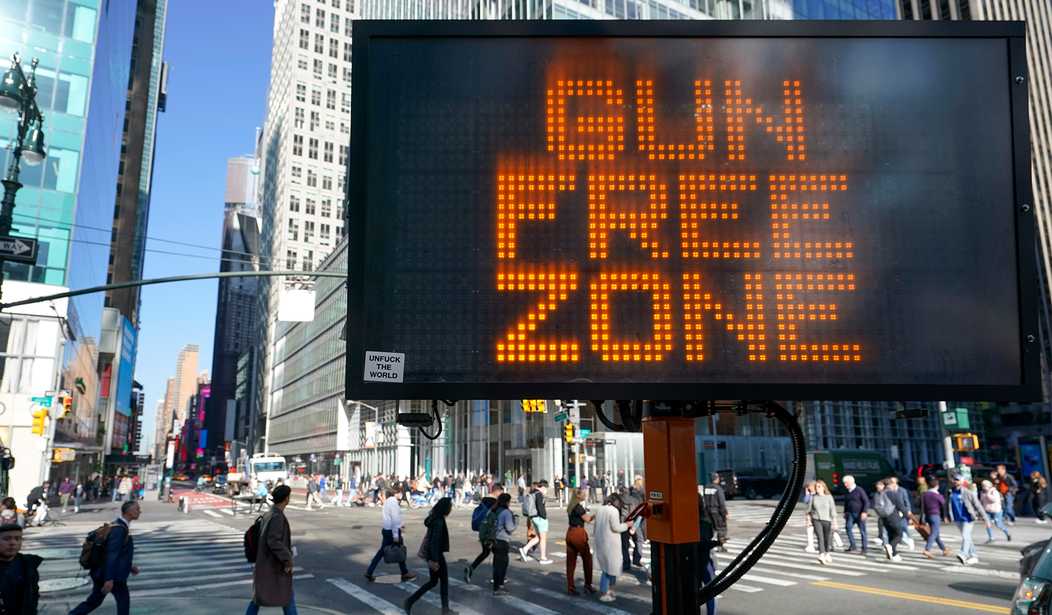A federal law prohibits gun possession within 1,000 feet of an elementary or secondary school. That restriction, a federal judge in Montana noted last week, "covers almost the entirety of every urban location in the United States, including many places that have nothing to do with the closest school."
U.S. District Judge Susan Watters nevertheless concluded that the federal Gun-Free School Zones Act is consistent with "the right of the people to keep and bear arms." The decision shows that some federal judges are still bending over backward to uphold constitutionally dubious gun control laws, despite the Supreme Court's recognition that the Second Amendment guarantees a right not only to keep firearms at home for self-defense but also to carry them in public for the same purpose.
The case involves Gabriel Metcalf, who lives across the street from Broadwater Elementary School in Billings, Montana. Last August, Metcalf was observed pacing his front yard while holding a rifle, a precaution he said was provoked by threats from a neighbor against whom his mother had obtained a protection order.
Since the Gun-Free School Zones Act makes an exception for guns "on private property not part of school grounds," Metcalf was not doing anything illegal provided he remained in his yard. But he admitted he had stepped onto the sidewalk and street near his house, which according to federal prosecutors made him guilty of a felony punishable by up to five years in prison.
The federal statute also includes an exception for people who are "licensed" to carry guns by the state where a school is located if law enforcement authorities "verify that the individual is qualified" to "receive the license." A Montana law says anyone who is legally allowed to own a gun "is considered to be individually licensed and verified by the state of Montana within the meaning of" the Gun-Free School Zones Act.
Recommended
That provision, Metcalf argued, meant he could not be prosecuted for violating the federal law. Watters disagreed, deeming Montana's notion of "verification" inadequate.
Watters then addressed the question of whether the Gun-Free School Zones Act is "consistent with this Nation's historical tradition of firearm regulation" -- the constitutional test prescribed by the Supreme Court. While the court has said schools themselves are "sensitive places" where the government may prohibit guns, she noted, that does not necessarily mean Congress was free to create 1,000-foot "buffer zones" around them.
Watters said the government, which had the burden of satisfying the Supreme Court's test, failed to do so. But instead of stopping there, she embarked on her own "analysis of the historical sources."
Watters claimed to locate "a historical analogue" in a 1776 Delaware constitutional provision and laws passed during or after Reconstruction that banned guns near polling places. She reasoned that education, like voting, is "essential for a responsible citizenry."
As George Mason law professor Robert Leider notes, it's not clear those Election Day restrictions were constitutional. Even assuming they were, their impact on the right to bear arms was modest compared to the impact of the Gun-Free School Zones Act, which applies all the time -- even when schools are not in session.
Anyone who is allowed to publicly carry a gun under state law but not "licensed" by federal criteria commits a felony whenever he traverses a school zone -- which is hard to avoid and, as Metcalf's case illustrates, could mean simply leaving home -- unless the weapon is unloaded and "in a locked container." And given the law's wording, the same is true of anyone with an out-of-state carry permit that is recognized by the state he is visiting, even when obtaining that permit entailed federally acceptable "verification."
Watters' opinion, Leider says, "shows the continued ease with which motivated judges can manipulate the Supreme Court's legal tests." He warns that the 2022 decision upholding the right to bear arms will have "minimal" practical impact "unless the Supreme Court invests significant effort to defend its judgment."

























Join the conversation as a VIP Member